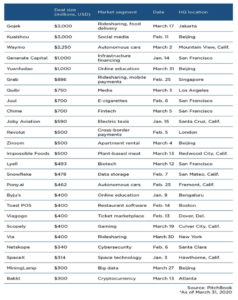Despite global changes and totally reshaping business in many spheres, there are still plans and goals to hit in upcoming future. That is also true for VC and startups that are born and growing in such a turbulent time. It’s interesting to know the focus for those who are predating in this field.
Venture capitalists are like a herring being swallowed by tuna. Acquisitions are one reason that, despite the efflorescence of new startups, power in tech flows toward the giants at the top.
How is that relevant to web development or digital startups?
Some startups are created to be sold, and for them monitoring VC interests are crucial. Given current conjecture reshaping, digital startups mandatory include web development components in their ecosystem.
Last year in the US, investors poured a record $11B+ into digital healthcare startups — a 16% uptick year-over-year. This year has seen big rounds go to companies innovating across health insurance (Clover Health raised a $500M Series E), genomics (Ginkgo BioWorks raised a $290M Series E at a $4.2B valuation), pharmacies (Capsule raised a $200M Series C), and more.
Therefore, it is safe to say that venture capital seeks for digital startups as never before. The whole world is now striving for digitalization, which starts with simple web development efforts and growth to data analysis, enterprise automation, business digital conversion.
Ventures tend to focus on these 6 investment areas this year: AI, Edge Computing, Media Tech, Digital Health, Consumer Empowerment, Future Consumer.
Industries under VC focus
AI
Successful digital or e-commerce businesses actively implement innovative web development technologies in their work, such as voice searches, chatbots, and other artificial intelligence solutions.
Artificial Intelligence can also be used in web design and development.
The AI is handy when business evolves from manual operations to automated processes, that can be a basis for further AI development.
Few tasty numbers and statistics about AI companies.
- SambaNova Systems, which makes computer chips for the internet of things, just raised $250 million in Series C funding at a $2.5 billion valuation
- Since the start of 2010, no startup has logged a bigger step-up multiple on its first round of unicorn funding than Dropbox, according to PitchBook data. In October 2008, during the financial crisis, the file-hosting specialist raised $6 million at a $25 million post-money valuation. It waited three years to raise its next round, a stretch during which the company’s user base exploded to more than 50 million, according to Forbes. In 2011, Dropbox brought in $250 million in funding at a $4 billion post-money valuation, making for a 150x leap.
- Almost two years before being acquired by Facebook, messaging specialist WhatsApp raised venture funding at a valuation of more than $1.6 billion, a 39x multiple on its prior round.
- Niantic, which is the developer of Pokémon Go, raised $200 million at a $2.9 billion valuation in 2017 to fund future augmented reality games, marking a 25.7x step-up.
- Bytedance, the Chinese internet colossus behind TikTok, attained a 22x step-up in 2017.
- Magic Leap, the maker of high-powered augmented reality headsets. In February 2014, the Florida-based company raised VC at a $101.3 million valuation. Eight months later, it collected a massive $542 million round at a $1.54 billion valuation, a 9.9x step-up for its first foray into unicorn territory. [6]
Fintech industry
Some of the biggest startups in fintech are chasing down new funding, and one of the biggest firms in VC is leading the charge.
Stripe’s services are central to many companies that are increasingly relevant during a time of social distancing, including names like Instacart, DoorDash, Slack, DocuSign and Blue Apron. That’s probably one reason big-name investors such as Andreessen Horowitz, General Catalyst and Sequoia were willing to write big checks for the second time in less than a year.
It isn’t only new VC deals: Other fintech startups have been garnering hefty price tags in recent months on the M&A market. Visa agreed to buy Plaid for $5.3 billion. Intuit is planning a $7.1 billion purchase of Credit Karma. And last week, SoFi lined up a $1.2 billion acquisition of Galileo Financial Technologies.
Each of the past two years, the fintech industry set a new annual record for cumulative global investment across VC, PE and M&A, according to PitchBook data. Even in the face of a global disaster, it could be in line for another new record in 2020.
Big healthcare bucks
Blackstone made an unorthodox bet on biotech this week, agreeing to invest $2 billion in debt and equity in publicly traded Alnylam. The deal calls for Blackstone to receive 10% of all future royalties from a new treatment for high cholesterol called inclisiran. Elsewhere, PE Hub reported that TPG Capital agreed to invest in LifeStance Health Partners, a provider of outpatient behavioral health service based near Seattle, at a $1.2 billion valuation. [3]
Biotech boom
With healthcare at the front of everyone’s mind, firms and startups in the biotech space are reeling in funding. ARCH Venture Partners closed its latest flagship fund and a related overage fund on a combined $1.46 billion this week, while Flagship Pioneering pulled in $1.1 billion for a new fund. ElevateBio closed a $170 million round to support its cell and gene therapies, while other names like RemeGen and Affinia Therapeutics raised huge rounds of their own. There was even an IPO, as Zentalis Pharmaceuticals raised more than $165 million in its debut on the Nasdaq. [4]
A sudden, widespread shift to remote work has left many companies vulnerable, and cybercriminals are flooding email inboxes with schemes designed to capitalize on panic surrounding the virus. As of March 26, the number of coronavirus-related phishing attacks had spiked 667% since the prior month, according to IT security company Barracuda Networks.
Expects the pace of venture capital investment in cybersecurity to accelerate, particularly for companies that can predict risks. The sector has already seen rapid growth in recent years, with the global amount of VC dollars dedicated to cybersecurity rising from less than $1 billion in 2009 to $7.9 billion last year, according to PitchBook data. So far this year, VCs have invested $1.7 billion in the space across 109 deals.
Alex Ferrara, a partner at Bessemer Venture Partners, believes the cybersecurity industry will be more insulated than others if the economic turmoil that has resulted from COVID-19 leads to a recession. He noted that IT budgets allocated to security are continuously increasing, and as people spend increasingly more time online, the need for cybersecurity will also grow, which could make the sector a relative safe haven for VCs. [5]
Telemedicine
Telemedicine startups in the US are experiencing a surge in demand amid the coronavirus outbreak, helped in part by a push from the federal government and health insurers.
The volume of virtual visits has roughly doubled for AI-enabled telehealth platform 98point6. Virtual clinic usage at Amwell (formerly American Well) has surged roughly 40% above normal in recent days, and startup Ro said it has seen “significant” growth in coronavirus-related online visits. Trump described telehealth as a “fairly new and incredible thing that’s happened in the not-so-distant past.” Healthtech has seen strong investment growth in recent years, claiming a record $7.8 billion in VC investment in 2019, according to PitchBook data.
Conclusions
Vc in Q1
Q1 2020 kicked off the new decade with momentum from previous years of record-setting levels in the VC industry. Deal activity remained strong with 2,298 deals totaling $34.2 billion in deal value, setting the year on pace to near-record levels. Median deal size and pre-money valuations at the late stage dropped, and exits saw a precipitous decline in Q1 as public market volatility has forced late-stage companies to reevaluate their options. All in all, Q1 2020 was carried largely by deal, exit, and fundraising activity that began before the global coronavirus pandemic and is primed to represent an inflection point in the VC industry as investors and entrepreneurs brace for impact. [9]

Top 25 companies in which VC invested
References
1. https://www.newyorker.com/magazine/2020/01/27/is-venture-capital-worth-the-risk
2. https://www.cbinsights.com/research/tech-giants-digital-healthcare-investments/
3. https://pitchbook.com/news/articles/9-big-things-fintech-unicorns-find-pandemic-funding
4. https://pitchbook.com/news/articles/9-big-things-quarantine-is-a-quagmire-for-gig-startups
5. https://pitchbook.com/news/articles/privitar-lands-80m-as-cybersecurity-interest-grows-amid-covid-19
6. https://pitchbook.com/news/articles/11-big-things-one-giant-leap-for-startup-kind
7. https://www.ft.com/content/60359c79-0161-46e2-bed5-a30d372834b7?shareType=nongift
8. https://www.ft.com/content/691390ca-53d9-11ea-90ad-25e377c0ee1f
9. https://pitchbook.com/news/reports/q1-2020-pitchbook-nvca-venture-monitor?utm_medium=nl-na&utm_source=reports&utm_campaign=q1-2020-pitchbook-nvca-venture-monito


